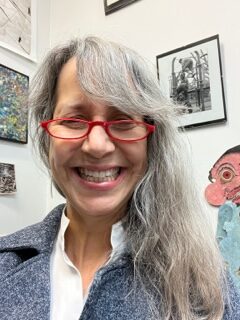Before All the World (Farrar, Straus and Giroux, 2022) offers an immersion into the Yiddish of my parents and grandparents, but not in the way of the one-liner punches of the Borscht Belt. The book contains the living Yiddish of poets and Communists, and not all of the Yiddish words in this artfully crafted novel are translated, reminding us that the act of reading is itself a puzzle. There is no glossary, although there are footnotes — footnotes that offer further dialogues inside dialogues. And yet, this complex narrative or mayse really only has three main characters, Leyb, Gittl and Charles, themselves surely real and alive. There are two settings, “Zatelsk,” a made up “dust village” somewhere in northeastern Ukraine and then “philadelphiye” where the three meet. Our trio embodies intersectional politics, and between the three of them, they live out the traumas experienced by young women, gay men, Jews, Black people, immigrants and the invisible.
Moriel Rothman-Zecher — poet, novelist, winner of prizes, including the National Jewish Book Award — writes fiction with the ear of a folklorist, and Yiddish phrases are literally translated, just like a real immigrant might speak them:
And breath “upfilled” his body
And around a neck was “fleshpressure”
And shirts from a box are “outtook “
And people are “frontstanding” and “behindcoming”
And inventions are “scientifish”
And friends are “almoststrangers.”
They greet each other with “What do you make?” Appreciation is offered with “A beautiful thanks.”
I had the pleasure of hearing Rothman-Zecher read from Before All the World at the University of the Arts where we both teach. In the small library where the event was held, I marveled at the Yiddish spoken sweetly, seductively, which for many Jews of our generation is associated only with aging or religious fanaticism. I confess that there were moments I laughed so hard my eyes wet, and as I guffawed, I realized that I was the only person in the room making any sound. The challenge of the book is that there are so many linguistic references, inside jokes, so much word play that although my colleagues clearly enjoyed the reading, I fear they missed most of it. But isn’t this true when we listen to a great jazz album with friends? Surely, my saxophonist colleague hears Coltrane differently than I do, his ears capturing so much more than mine? My painter friends recognize motifs in new pieces that are likely beyond my knowledge. Why is language different? The book seems to advocate for multilingualism.
On one level, Before All the World is about leaving the pogroms of Eastern Europe for a better life, and yet perhaps not. Violence was witnessed in both Philadelphia and Zatelsk. The hunger in both places is palpable; the trauma made this reader weep. These spiritual-but-not-religious characters burn with their own yearnings — emotional, political, sexual. Somehow, Rothman-Zecher has given us a history lesson disguised as a set of love stories. There is a lot of shtipping.
Like our trio of characters, we end up on Broad Street in Philadelphia, at the Jewish Y, ironically across the very street where the book reading took place, or in an underground gay drinking establishment, or in the home of a wealthy Jewish patron. The narrative shifts geographically, not just old world and new world but of this world and the world of the dead; all boundaries are fluid. For some, this may be dizzying, but with language as an anchor, even with its shape shifting, I felt at home. Some readers may wish to listen to the book on tape in order to be rooted in this tilt-a-whirl. Although I have read through my print copy three times, it would be worth hearing Rothman-Zecher read his own audio book, as he has been given that privilege. For this reader, even the silent act of reading was a sound bath.
Before All the World also challenges us with a refrain that demands ethical decision-making. We are asked, like our characters: “What will we do before all the world?” And to give us courage with whatever we decide, one of the characters choruses: “I do not believe all the world is darkness.” Rothman-Zecher is unafraid of deep philosophical wrestling, as their first novel, Sadness Is a White Bird, paired Palestinian siblings with a Jewish Israeli friend: Nimreen, Laith and Jonathan. Like Sartre’s No Exit, Sadness Is a White Bird offers no way out. Before All the World triangulates differently with Leyb, Gittl and Charles. Hope somehow emerges from trauma. Love is possible and in a variety of forms.
I hear idioms from my own grandparents reverberating on these pages, Er lacht mit jascherkess, the laughing with leeches, the rozhinkes mit mandlen, the raisins and almonds, the Tumbalaleika, yo. For those who crave more of such sounds, one could go back in time with collections such as “Yiddish Proverbs, Sayings, Etc.” by Leah Rachel Yoffie as published in the Journal of American Folk-Lore, 1920, Vol 33. Or read and re-read Chaim Potok, I. L. Peretz, Isaac Bashevis Singer or the great Yiddish poet Anna Margolin. Rothman-Zecher acknowledges their own debt to Margolin in the note section.
To honor Gittl, the female of our fictional trio, I close with this poem by the real Anna Margolin, aka Rosa Lebensboym. “The Song of a Girl” ends with these words:
Oh, sheyner, vill ikh itst azoy fil dir sheynken.
Tsi libe? Tsi toyt? Veys ikh es den?
Nor es boygt mikh, es vigt mikh, vi a shturem, a beynken.
Kum un farbren.
Oh lovely one, I want to give you so much now.
Love? Death? Do I even know?
But a yearning bends me, it rocks me, like a storm.
Come and burn through.
(Trans. Maia Evrona. July 14, 2014, 4 poems by Anna Margolin translated by Maia Evrona. Tupelo Quarterly)







